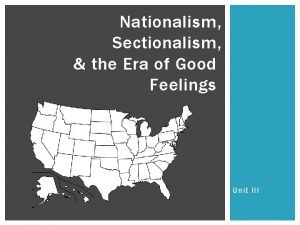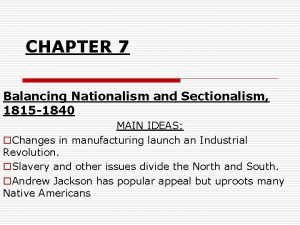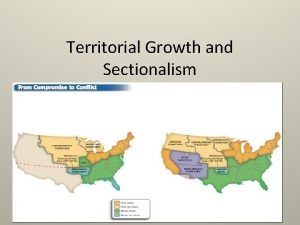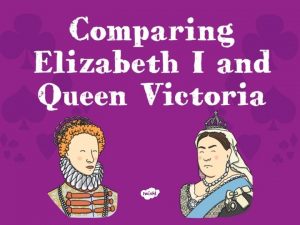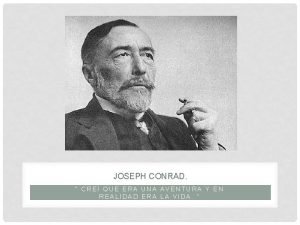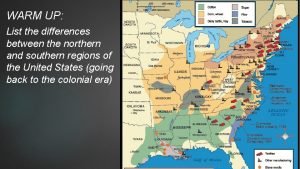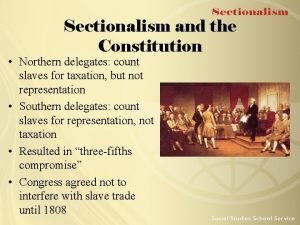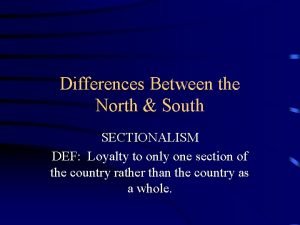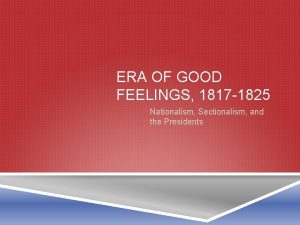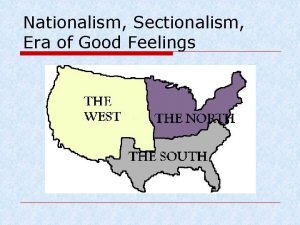Nationalism and Sectionalism and the Era of Good


















- Slides: 18

Nationalism and Sectionalism, and the “Era of Good Feelings”: What is the difference between nationalism and sectionalism, and what key events took place during the “Era of Good Feelings”

Is it more important to you that North Carolina or the U. S. A. succeed?

Nationalism Sectionalism • Belief that national interests should be placed ahead of regional concerns or the interests of other countries • The placing of the interests of one’s own region ahead of the interests of the nation as a whole. – Ex: Henry Clay’s American System, and transportation like Cumberland Road – Monroe opposed Cumberland road as unconstitutional. Felt it benefited one region over another – Ex: Hartford Convention


“Era of Good Feelings” • During James Monroe’s administration there was only one effective political party.



1 st Seminole War • Runaway slaves went to Spanish Florida and joined natives who protected runaways • Andrew Jackson crosses the border to fight Seminoles, kills two British citizens. – Totally exceeded his orders. – But JQ Adams uses this as a way to show Spanish obviously can’t defend Florida, we buy through Adams-Onis Treaty


Panic of 1819 • Post war demand for goods caused farmers to expand. • To Western and Southern • Public land out west was farmers, the Bank of the US sold on easy terms of credit was a “monster”, and they (little money down, pay it blamed the Tariff of 1816 as later!) which caused land the cause of the panic. prices to soar. • However, prices of cotton and other products in Britain fell, and the inflated land value collapsed. • Banks and the Bank of US demanded debts to be paid. Farmers went bankrupt and lost their farms.


Election of 1824 • 4 candidates – Jackson, John Quincy Adams, Henry Clay, Crawford • No one gets a majority – the election decided by House of Reps. • Henry Clay (speaker of house) gets enough votes for Adams, and Clay later becomes Sec. of State (seen as traditional stepping stone for pres. ) • Jackson says he smells a “corrupt bargain” & starts campaigning for 1828.

The Democratic Party is born!

Jacksonian Democracy • During JQA’s administration & by 1828 most states removed property qualifications for voting. • Now poor white males can vote; who will they vote for?

Election of 1828 • John Quincy Adams – Lacked common touch. – Brilliant, but prone selfrighteousness. – Son of previous president John Adams • Andrew Jackson – Reputation as a frontiersmen – War hero – Fought many duels, killed a man, and called “Old Hickory”


• Jackson, depicted as the “Common Man” wins in a landslide – Reception party in White House almost a riot

 Era of good feelings nationalism and sectionalism
Era of good feelings nationalism and sectionalism What's the difference between nationalism and sectionalism
What's the difference between nationalism and sectionalism Quiz 3: nationalism and sectionalism
Quiz 3: nationalism and sectionalism Nationalism and sectionalism venn diagram
Nationalism and sectionalism venn diagram Chapter 7 balancing nationalism and sectionalism
Chapter 7 balancing nationalism and sectionalism Nationalism vs sectionalism
Nationalism vs sectionalism Good deeds good words good thoughts
Good deeds good words good thoughts Good evening morning
Good evening morning Good afternon animado
Good afternon animado Nothing compares to your embrace
Nothing compares to your embrace Cómo se dice buenas tardes
Cómo se dice buenas tardes Era quiz: the baroque era
Era quiz: the baroque era Elizabethan and victorian era
Elizabethan and victorian era Creí que era una aventura y en realidad era la vida
Creí que era una aventura y en realidad era la vida Vi uma estrela tão alta
Vi uma estrela tão alta Sectionalism map of the united states
Sectionalism map of the united states West sectionalism
West sectionalism Sectionalism def
Sectionalism def American system apush
American system apush
